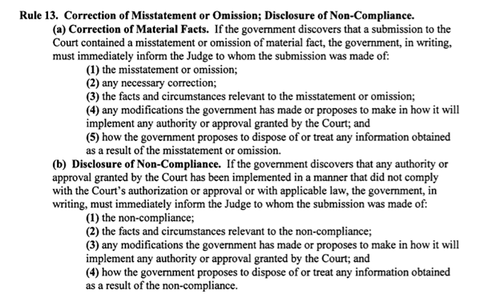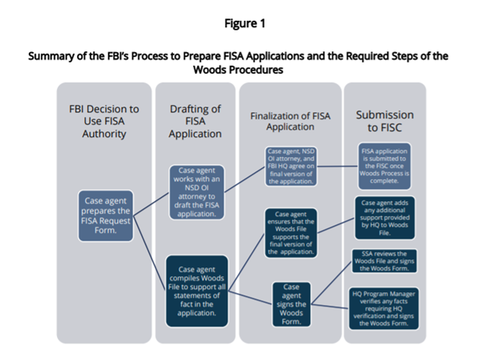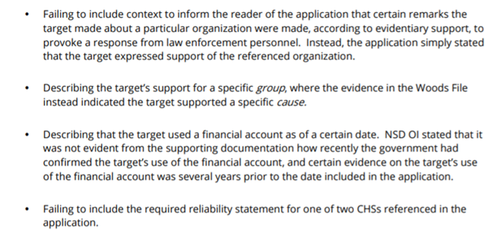Authored by Jack Phillips and Ken Silva via The Epoch Times,
Justice Department Inspector General Michael Horowitz issued a report (pdf) on Sept. 30 on the FBI’s applications to surveil U.S. citizens, finding “widespread” failure that “raises serious questions” and criticizing agents for not fixing flaws spotted in previous audits.
The inspector general (IG) reviewed about 7,000 applications for Foreign Intelligence Surveillance Act (FISA) warrants—the same used to surveil former Trump campaign aide Carter Page in 2016—and found that the agency had failed to follow key rules, the Woods Procedures, in the program. In December 2019 review, Horowitz discovered 17 significant errors and omissions in the FISA surveillance application targeting Page.
The most recent audit of the agency’s Woods Procedures—rules that the FBI follows to ensure that FISA applications are “scrupulously accurate”—found sweeping “non-compliance” that “raises serious questions about the adequacy and execution of the supervisory review process in place at the time of the applications we reviewed,” Horowitz said, stating that the FBI’s quality-control officials apparently missed these problems.
His office also identified 183 FISA applications that had a missing or incomplete Woods file, which is a document meant to ensure the accuracy of statements made to the secretive FISA court. The report also found hundreds of other cases where there were instances of noncompliance with the agency’s Woods procedures.
“A failure to adhere to the Woods Procedures … could easily lead to errors that do impact probable cause—and therefore potentially call into question the legal basis for the government’s use of highly intrusive FISA warrants,” Horowitz wrote.
Horowitz recommended that the FBI attempt to make “additional efforts to communicate and emphasize to its workforce the importance” of the bureau’s own standards when applying for FISA warrants.
In a statement released after Horowitz’s report, the FBI told media outlets on Sept. 30 that it appreciated the IG’s “determined focus on the FBI’s FISA process, especially given the significant changes and policy enhancements that we have worked to make in concert with, and in many instances, prior to the issuance of this most recent OIG Audit Report.”
The federal law enforcement bureau will accept Horowitz’s recommendations detailed in the report and has adopted about half of them already, according to the statement. FBI officials didn’t immediately respond to a request for comment.
The audit report is an extension of a report that was issued by Horowitz in March 2020, when he reviewed 29 FISA applications. According to that report, the inspector general couldn’t review four of the applications because the FBI wasn’t able to locate them. Of the 25 he could review, all of them had flaws—209 errors in total, Horowitz said.
“Our testing of FISA applications … identified apparent errors or inadequately supported facts in all of the 25 applications we reviewed, and interviews to date with available agents or supervisors in field offices generally have confirmed the issues we identified,” he said in his March report.
Horowitz lamented in the Sept. 30 audit that the FBI hasn’t taken his earlier report seriously.
“In response to the findings in our December 2019 FISA report and March 2020 [report], the FBI Director publicly acknowledged the seriousness of the identified problems and announced numerous steps the FBI was undertaking to address them,” he said.
“However, we believe certain public statements from the FBI and NSD in 2020 failed to recognize the significant risks posed by systemic non-compliance with the Woods Procedures, and during our audit, some FBI field personnel minimized the significance of Woods Procedures non-compliance.”
The IG report was likely referencing statements FBI Director Christopher Wray made to Congress in February, when he told representatives that they shouldn’t “lose any sleep” over the December 2019 IG report.
“The vast majority of the FISAs we do, both the initial applications and the renewals, are the kinds of applications that I am quite confident—we don’t know each other, but you wouldn’t lose any sleep over, and we wouldn’t want to grind to a halt,” Wray told Rep. Jim Jordan (R-Ohio) at the time.
Following the release of the latest report, Jordan took to Twitter to blast Wray for downplaying earlier concerns.
“Feb. 5, 2020: FBI Director Christopher Wray dismisses concerns about the FISA process. Says Americans shouldn’t ‘lose any sleep’ over it.
Today: IG Horowitz releases damning report about the FBI’s broken FISA process,” Jordan wrote.
“It was worse than we ever thought.”
The FBI’s failure to adhere to surveillance rules has led to criminal charges in some instances.
After Horowitz’s findings were released in 2019, special counsel John Durham later filed charges against former FBI Attorney Kevin Clinesmith for falsifying a document used in a FISA application to surveil Page. He pleaded guilty in August 2020.
In August, Durham’s office indicted Michael Sussmann, a lawyer who represented the Democratic National Committee, for allegedly lying to the FBI when he spoke to a top bureau official, James Baker, in 2016. On Sept. 17, Sussmann pleaded not guilty to the charge.
According to the indictment, Sussmann had passed along a claim alleging that there was a secret communications channel between a Russian bank and the Trump Organization. Durham alleged that Sussmann told Baker that he wasn’t representing a specific client, but was actually secretly representing Democrats, Clinton’s campaign, and an unnamed technology company executive.
How the process is supposed to work and more on Horowitz’s findings, from The Reactionary’s Techno Fog:
The FISA Court is a secret court where the government is present but the accused is not. As IG Horowitz explains:
“Unlike the use of other intrusive investigative techniques (such as wiretaps under Title III and traditional criminal search warrants) that are granted in ex parte hearings but can potentially be subject to later court challenge, FISA orders generally have not been subject to scrutiny through subsequent adversarial proceedings.”
Because this is an ex parte hearing, the DOJ/FBI have heightened duties of candor. According to the FISA Court’s local rules, the government is required to disclose all material facts and correct any misstatements of material facts:
This latest audit by IG Horowitz focused on the FBI’s compliance with the Woods procedures. This is how the process works:
Last year, IG Horowitz reviewed 29 random FISA applications. He found “that the FBI was not meeting the expectations of its own protocols.” As he reported in March 2020:
“We identified numerous instances of non-compliance with the Woods Procedures in the 25 Woods Files that were made available to us to review; and we reported that the FBI was unable to produce the original version of the remaining 4 Woods Files we requested.”
More concerning are the latest discoveries after an audit of more FISA applications. These include:
“over 400 instances of non-compliance with the Woods Procedures in connection with those 29 FISA applications”
“over 7,000 FISA applications authorized between January 2015 and March 2020, there were at least 179 instances in which the Woods File required by FBI policy was missing in whole or in part”
The more material errors (aside from losing their own files) included:
To put this into context, in December 2019, after IG Horowitz detailed substantial issues with the Carter Page FISA applications, the FISA Court noted that the misconduct was serious and ordered the FBI to conduct remedial measures to fix the problems of the FBI’s own creation. The FBI promised to take corrective action.
One can’t help but speculate that the FISA Court won’t do much about these latest issues, aside from ordering the FBI to conduct more training. After all, the then-presiding judge of the FISA Court, Judge Boasberg, refused jail time for FBI lawyer Kevin Clinesmith after he altered an e-mail and lied about Carter Page’s relationship with the CIA.
Knowing the history of the FISA Court excusing government misconduct, we present the same question now that we did after the Clinesmith sentencing: What does it say about the FISA Court’s “heightened duty of candor” if there aren’t heightened punishments for violating that duty?
And we have one final question – one that has applied to Director Wray for the last few years: how could the FBI Director allow these abuses to continue?






